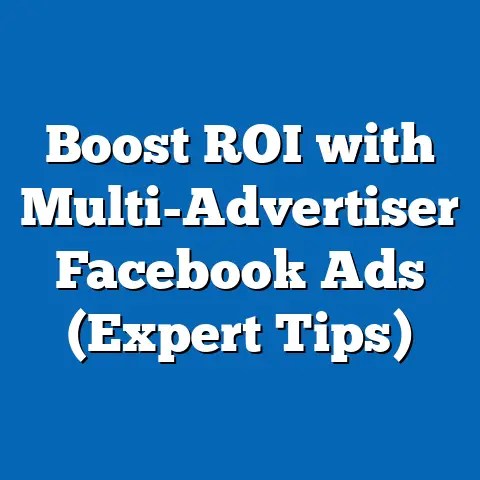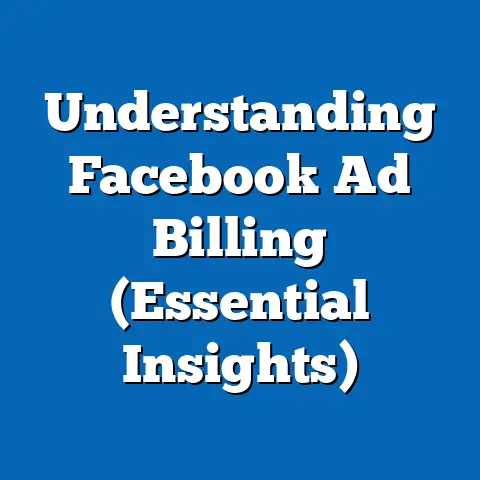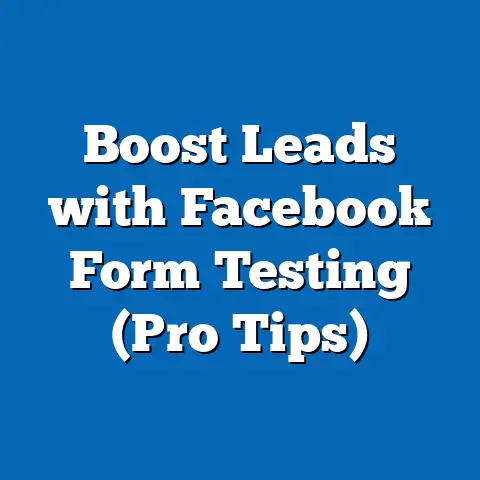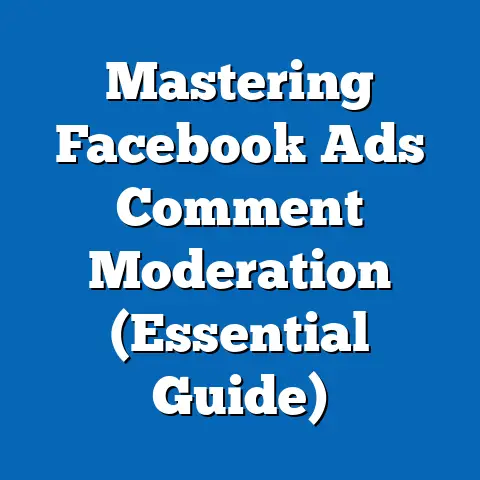Do You Need an LLC for Facebook Ads? (Essential Insights)
I remember the first time I dove into Facebook advertising for my own small online business. It was exhilarating! The potential to reach thousands of potential customers with just a few clicks was incredibly tempting. I envisioned a flood of sales, brand recognition skyrocketing, and a thriving business. But amidst the excitement of crafting the perfect ad copy and choosing the ideal target audience, a nagging question crept into my mind: Do I need to form an LLC (Limited Liability Company) before I start pumping money into Facebook Ads?
It felt like a daunting hurdle, a legal maze I wasn’t sure I was ready to navigate. I pictured Jane, a talented friend of mine who poured her heart and soul into crafting exquisite handmade jewelry. She, too, was eager to leverage the power of Facebook to reach a wider audience. She had stunning photos of her creations, compelling descriptions, and a clear understanding of her target customer. But then the legal questions started swirling. She asked me, “What if someone sues me because of my ads? What if I mess up the taxes? Do I really need to go through the hassle of forming an LLC just to sell my jewelry on Facebook?”
Jane’s story is not unique. Many small business owners and entrepreneurs find themselves in a similar predicament. They’re excited about the possibilities of Facebook advertising, but they’re also apprehensive about the legal and financial implications. The fear of making a costly mistake, whether it’s a legal misstep or a tax blunder, can be paralyzing.
This article aims to demystify the question of whether you need an LLC for Facebook Ads. I will break down the complexities of business structures, legal considerations, tax implications, and common misconceptions. I’ll share real-life examples and case studies to illustrate the potential benefits and risks of operating with and without an LLC. By the end, you’ll have a clearer understanding of the factors you need to consider to make an informed decision about your business structure and your approach to Facebook advertising. Let’s embark on this journey together and equip you with the knowledge you need to advertise confidently and responsibly.
Understanding Facebook Ads
Facebook Ads have become a cornerstone of modern digital marketing, and for good reason. They offer unparalleled reach, precise targeting capabilities, and a relatively low barrier to entry compared to traditional advertising methods. But what exactly are Facebook Ads, and why are they so important?
What are Facebook Ads?
Facebook Ads are paid advertisements that appear on the Facebook platform (including Instagram, Messenger, and the Audience Network). They are designed to promote a product, service, brand, or cause to a specific audience. Unlike organic posts, which are only seen by your followers and their connections, Facebook Ads can reach millions of potential customers based on demographics, interests, behaviors, and more.
I’ve seen firsthand how a well-crafted Facebook ad can transform a struggling business. A local bakery I worked with was facing declining sales. We launched a targeted Facebook ad campaign featuring mouthwatering photos of their pastries, focusing on users within a 5-mile radius who had expressed an interest in baking or local food. Within weeks, they saw a significant increase in foot traffic and a noticeable boost in revenue. That’s the power of targeted advertising.
Types of Facebook Ads
Facebook offers a variety of ad formats to suit different marketing objectives. Here are some of the most common types:
- Image Ads: Simple ads featuring a single image and accompanying text. These are great for showcasing products or services in a visually appealing way.
- Video Ads: Ads that use video to capture attention and convey a message. Video ads are highly engaging and can be used to tell stories, demonstrate products, or provide valuable information.
- Carousel Ads: Ads that display multiple images or videos in a scrollable format. Carousel ads are ideal for showcasing a range of products or highlighting different features of a single product.
- Collection Ads: Mobile-first ads that allow users to browse and purchase products directly from the ad. Collection ads are designed to provide a seamless shopping experience on mobile devices.
- Lead Ads: Ads that allow users to submit their contact information directly from the ad, without having to leave the Facebook platform. Lead ads are perfect for generating leads for sales teams or building email lists.
How Facebook Ads Work
The magic of Facebook Ads lies in its sophisticated targeting capabilities. Facebook allows you to target your ads based on a wide range of criteria, including:
- Demographics: Age, gender, location, education, relationship status, and more.
- Interests: Hobbies, passions, and topics that users have expressed interest in on Facebook.
- Behaviors: Purchase history, online activity, device usage, and other behaviors that indicate a user’s likelihood to engage with your ad.
- Custom Audiences: Audiences created from your own customer data, such as email lists or website visitors.
- Lookalike Audiences: Audiences that are similar to your existing customers, allowing you to reach new potential customers who share the same characteristics.
Once you’ve defined your target audience, you can set your budget and bidding strategy. Facebook offers a variety of bidding options, including:
- Automatic Bidding: Facebook automatically sets your bids to get the most results for your budget.
- Manual Bidding: You set your own bids for each ad, giving you more control over your ad spend.
The ultimate goal of Facebook advertising is to achieve a positive Return on Investment (ROI). This means that the revenue generated from your ads exceeds the cost of running them. To calculate your ROI, you need to track your ad spend, the number of conversions (e.g., sales, leads, website visits), and the value of each conversion.
The Effectiveness of Facebook Ads
Facebook Ads can be incredibly effective for small businesses and entrepreneurs. According to recent statistics, Facebook has over 2.9 billion monthly active users, making it the largest social media platform in the world. This massive audience provides unparalleled opportunities for businesses to reach potential customers.
Furthermore, Facebook Ads are highly targeted, allowing you to reach the right people with the right message at the right time. This can lead to higher conversion rates and a better ROI compared to traditional advertising methods.
I remember working with a local bookstore that was struggling to compete with online retailers. We launched a Facebook ad campaign targeting readers in the area who had expressed an interest in specific genres of books. The ads featured photos of the bookstore’s cozy atmosphere and highlighted upcoming author events. The campaign was a huge success, driving a significant increase in foot traffic and online sales.
Key Takeaway: Facebook Ads are a powerful tool for digital marketing, offering unparalleled reach, precise targeting, and a variety of ad formats to suit different marketing objectives. Understanding how Facebook Ads work and how to optimize your campaigns is crucial for achieving a positive ROI.
The Basics of Business Structures
Before diving into the legal and tax implications of running Facebook Ads, it’s essential to understand the basics of business structures. The way you structure your business can have a significant impact on your liability, taxes, and overall operations.
Why Business Structures Matter
Your business structure determines how your business is legally recognized, how your income is taxed, and the extent to which you are personally liable for your business debts and obligations. Choosing the right business structure is a critical decision that can affect your long-term success.
I’ve seen too many entrepreneurs overlook this crucial step, only to regret it later when they face unexpected legal or financial challenges. It’s like building a house without a solid foundation – it might look good on the surface, but it’s vulnerable to collapse.
Types of Business Entities
There are several different types of business entities, each with its own advantages and disadvantages. Here are some of the most common:
- Sole Proprietorship: A business owned and run by one person, where there is no legal distinction between the owner and the business. This is the simplest business structure to set up, but it offers no liability protection.
- Partnership: A business owned and run by two or more people, who share in the profits and losses of the business. Like sole proprietorships, partnerships offer no liability protection.
- Limited Liability Company (LLC): A business structure that combines the pass-through taxation of a partnership or sole proprietorship with the limited liability of a corporation. LLCs offer liability protection to their owners (members), meaning that their personal assets are protected from business debts and obligations.
- Corporation: A legal entity that is separate and distinct from its owners (shareholders). Corporations offer the strongest liability protection, but they are also the most complex and expensive to set up and maintain.
Advantages and Disadvantages of Operating as an LLC
LLCs have become increasingly popular among small business owners and entrepreneurs due to their unique blend of benefits. Here’s a closer look at the advantages and disadvantages of operating as an LLC:
Advantages:
- Liability Protection: This is the primary benefit of an LLC. As a member of an LLC, your personal assets are generally protected from business debts and obligations. This means that if your business is sued or incurs debt, your personal savings, home, and other assets are typically safe.
- Tax Flexibility: LLCs offer tax flexibility. They can be taxed as a sole proprietorship, partnership, or corporation, depending on the owner’s preference. This allows you to choose the tax structure that is most advantageous for your specific situation.
- Credibility: Operating as an LLC can enhance your business’s credibility with customers, suppliers, and lenders. It demonstrates that you are serious about your business and that you have taken the necessary steps to formalize it.
- Ease of Setup: LLCs are relatively easy and inexpensive to set up compared to corporations. The process typically involves filing articles of organization with your state and paying a filing fee.
Disadvantages:
- Cost: While LLCs are generally less expensive to set up than corporations, there are still costs involved, including filing fees and annual maintenance fees.
- Complexity: LLCs can be more complex to manage than sole proprietorships or partnerships. You need to maintain separate financial records, comply with state regulations, and potentially file additional tax forms.
- Limited Life: In some states, an LLC may dissolve if a member leaves or dies. This can be a disadvantage for businesses that want to ensure long-term continuity.
Examples of Businesses Operating as LLCs
LLCs are a popular choice for a wide range of businesses, including:
- Freelancers and Consultants: Many freelancers and consultants operate as LLCs to protect their personal assets from potential lawsuits or liabilities.
- Real Estate Investors: LLCs are often used to hold real estate investments, providing liability protection and tax benefits.
- Small Business Owners: Many small business owners, such as restaurant owners, retail store owners, and service providers, choose to operate as LLCs to protect their personal assets.
Businesses that may not typically operate as LLCs include large corporations that require significant capital investment and a more complex organizational structure.
Key Takeaway: Choosing the right business structure is a critical decision that can affect your liability, taxes, and overall operations. LLCs offer a unique blend of benefits, including liability protection, tax flexibility, and enhanced credibility, making them a popular choice for small business owners and entrepreneurs.
The Legal Considerations of Running Facebook Ads
Running Facebook Ads, while seemingly straightforward, involves several legal considerations that business owners need to be aware of. These considerations range from adhering to Facebook’s advertising policies to complying with local and federal regulations.
Adherence to Facebook’s Advertising Policies
Facebook has a comprehensive set of advertising policies that govern the types of ads that are allowed on its platform. These policies cover a wide range of topics, including:
- Prohibited Content: Ads that promote illegal products or services, discrimination, hate speech, violence, or misinformation are strictly prohibited.
- Restricted Content: Ads that promote certain types of products or services, such as alcohol, gambling, or firearms, may be subject to restrictions and require prior approval from Facebook.
- Personal Attributes: Ads that directly or indirectly target individuals based on their personal attributes, such as race, ethnicity, religion, gender, sexual orientation, or health condition, are prohibited.
- Misleading or Deceptive Content: Ads that contain false or misleading information, or that make unsubstantiated claims, are not allowed.
I’ve seen ads get rejected for the most unexpected reasons. A health and wellness company I consulted with had an ad for a natural supplement flagged because it made implied health claims that weren’t explicitly backed by scientific evidence. It’s crucial to thoroughly review Facebook’s advertising policies before launching any ad campaign to avoid rejection or account suspension.
Business Registration and Compliance
Depending on your location and the nature of your business, you may be required to register your business with local and federal authorities. This may involve obtaining a business license, registering your business name, and complying with other regulations.
Operating without proper business registration can expose you to legal risks, including fines, penalties, and even lawsuits. Forming an LLC can help you comply with these regulations and demonstrate that you are operating a legitimate business.
Running Ads Without a Formal Business Structure
Running Facebook Ads without a formal business structure, such as an LLC, can have significant legal implications. As a sole proprietor or partner, you are personally liable for your business debts and obligations. This means that if your business is sued or incurs debt, your personal assets are at risk.
For example, if your Facebook ad makes a false or misleading claim that leads to a lawsuit, you could be personally liable for the damages. Similarly, if your business incurs debt that it cannot repay, your personal assets could be seized to satisfy the debt.
Intellectual Property Rights
Protecting your intellectual property rights is crucial when running Facebook Ads. This includes your trademarks, copyrights, and patents.
- Trademarks: Your brand name, logo, and other identifying marks are protected by trademark law. You should register your trademarks with the U.S. Patent and Trademark Office to protect them from infringement.
- Copyrights: Your original content, such as photos, videos, and written text, is protected by copyright law. You should ensure that you have the necessary rights to use any copyrighted material in your Facebook ads.
- Patents: If your product or service is based on a patented invention, you should ensure that you have the necessary rights to use the patent in your Facebook ads.
Forming an LLC can help protect your intellectual property rights by providing a legal entity that can own and enforce these rights.
Key Takeaway: Running Facebook Ads involves several legal considerations, including adherence to Facebook’s advertising policies, compliance with local and federal regulations, and protection of intellectual property rights. Forming an LLC can help you mitigate these risks and operate your business more confidently.
Tax Implications of Running Facebook Ads as an LLC
Understanding the tax implications of running Facebook Ads is crucial for any business owner. The way your business is structured, particularly whether you operate as an LLC, can significantly impact your tax liabilities and deductions.
Tax Responsibilities: Individuals vs. LLCs
When you operate as a sole proprietor or partner, your business income is taxed as personal income. This means that you report your business income and expenses on your personal tax return (Form 1040).
However, when you operate as an LLC, you have more flexibility in how your business is taxed. You can choose to be taxed as a sole proprietorship, partnership, or corporation.
- Taxed as a Sole Proprietorship or Partnership: In this case, your business income is still taxed as personal income, but you may be able to take advantage of certain deductions that are not available to individuals.
- Taxed as a Corporation: In this case, your business income is taxed separately from your personal income. This can be advantageous if you want to reinvest profits back into your business or if you want to take advantage of certain corporate tax benefits.
I’ve seen many LLC owners initially default to being taxed as a sole proprietorship for simplicity. However, as their businesses grew, they realized that electing to be taxed as an S-Corp could significantly reduce their self-employment taxes. It’s worth consulting with a tax professional to determine the most advantageous tax structure for your LLC.
Taxing Income from Facebook Ads
Income generated from Facebook Ads is considered business income and is subject to taxation. The amount of tax you owe will depend on your business structure and your overall income.
If you operate as a sole proprietor or partner, you will report your Facebook Ads income on Schedule C of your personal tax return. If you operate as an LLC taxed as a corporation, you will report your Facebook Ads income on Form 1120 (for C corporations) or Form 1120-S (for S corporations).
Deductions Available to LLC Owners
One of the significant advantages of operating as an LLC is the ability to deduct business-related expenses. These deductions can help reduce your taxable income and lower your overall tax liability.
Some common deductions available to LLC owners include:
- Advertising Expenses: The cost of running Facebook Ads is fully deductible as an advertising expense.
- Business-Related Costs: Other business-related costs, such as website hosting, software subscriptions, and office supplies, are also deductible.
- Home Office Deduction: If you use a portion of your home exclusively for business purposes, you may be able to deduct a portion of your home-related expenses, such as rent, utilities, and mortgage interest.
- Travel Expenses: If you travel for business purposes, you may be able to deduct your travel expenses, such as airfare, hotel costs, and meals.
Maintaining Proper Financial Records
Maintaining proper financial records is essential for tax purposes. This includes tracking your income, expenses, and assets.
Operating as an LLC can simplify this process by requiring you to maintain separate financial records for your business. This makes it easier to track your income and expenses and to prepare your tax returns.
Key Takeaway: Understanding the tax implications of running Facebook Ads as an LLC is crucial for minimizing your tax liability and maximizing your profits. LLCs offer tax flexibility and the ability to deduct business-related expenses, making them a popular choice for small business owners and entrepreneurs.
Case Studies and Real-Life Examples
To further illustrate the importance of business structure in the context of Facebook advertising, let’s examine some case studies and real-life examples of entrepreneurs who have launched Facebook ad campaigns with varying degrees of success.
Success Story: The Boutique Clothing Store
Sarah owned a small boutique clothing store that was struggling to attract customers. She decided to launch a Facebook ad campaign targeting women in her local area who were interested in fashion and style. Sarah operated her business as an LLC.
Her ads featured stylish photos of her clothing and highlighted her unique selection of items. The campaign was a huge success, driving a significant increase in foot traffic and online sales.
Because Sarah operated her business as an LLC, her personal assets were protected from any potential liabilities arising from her advertising activities. This gave her peace of mind and allowed her to focus on growing her business.
Cautionary Tale: The Freelance Designer
John was a freelance graphic designer who decided to launch a Facebook ad campaign to promote his services. He operated his business as a sole proprietorship.
His ads featured examples of his work and highlighted his competitive pricing. The campaign generated a lot of leads, but John was overwhelmed with the workload and struggled to deliver high-quality work on time.
One of his clients was unhappy with the quality of his work and threatened to sue him for breach of contract. Because John operated his business as a sole proprietorship, his personal assets were at risk.
John learned a valuable lesson about the importance of liability protection and the benefits of operating as an LLC.
The E-Commerce Startup
A group of friends launched an e-commerce startup selling eco-friendly products. They initially operated as a partnership but quickly realized they needed more robust liability protection and tax flexibility. They formed an LLC and elected to be taxed as an S-Corp.
Their Facebook ad campaigns were highly effective, driving significant revenue growth. The LLC structure allowed them to attract investors, protect their personal assets, and optimize their tax strategy.
Lessons Learned
These case studies and real-life examples highlight the importance of choosing the right business structure and the potential benefits of operating as an LLC.
- Liability Protection: An LLC can protect your personal assets from business debts and obligations, providing peace of mind and allowing you to focus on growing your business.
- Tax Flexibility: An LLC offers tax flexibility, allowing you to choose the tax structure that is most advantageous for your specific situation.
- Credibility: Operating as an LLC can enhance your business’s credibility with customers, suppliers, and lenders.
While forming an LLC may not be strictly necessary for all Facebook advertisers, it can provide significant benefits in terms of liability protection, tax advantages, and professional credibility.
Key Takeaway: Real-life examples demonstrate the tangible benefits of having an LLC, especially in scenarios where advertising activities might lead to legal or financial complications. These stories underscore the importance of considering your business structure in the context of your advertising efforts.
Common Misconceptions About LLCs and Facebook Ads
Despite the numerous benefits of operating as an LLC, there are several common misconceptions that can deter business owners from taking this step. Let’s debunk some of these myths and provide clarity on the relationship between LLCs and Facebook Ads.
Myth 1: You Need an LLC to Run Facebook Ads
One of the most prevalent misconceptions is that you absolutely need an LLC to run Facebook Ads. This is not entirely true. Facebook does not require you to have an LLC to advertise on its platform. You can run ads as a sole proprietor or partner.
However, as we’ve discussed, operating without an LLC can expose you to significant legal and financial risks. While it’s not a mandatory requirement, it’s a highly recommended best practice for protecting your personal assets and operating your business responsibly.
Myth 2: LLCs Guarantee Complete Protection from Lawsuits
While LLCs offer liability protection, it’s important to understand that this protection is not absolute. There are certain situations where your personal assets may still be at risk, even if you operate as an LLC.
- Personal Guarantees: If you personally guarantee a business debt or loan, you may be held personally liable for the debt, even if your business is an LLC.
- Fraudulent or Illegal Activities: If you engage in fraudulent or illegal activities, you may be held personally liable, regardless of your business structure.
- Piercing the Corporate Veil: In certain cases, a court may “pierce the corporate veil” and hold the members of an LLC personally liable if they have commingled personal and business assets or have engaged in other improper conduct.
It’s crucial to operate your LLC responsibly and to maintain a clear separation between your personal and business finances to maximize your liability protection.
Myth 3: LLCs are Expensive and Difficult to Set Up
Another common misconception is that LLCs are expensive and difficult to set up. While there are costs involved, the process is generally straightforward and affordable.
The cost of setting up an LLC varies by state, but it typically ranges from a few hundred dollars to a few thousand dollars. You can set up an LLC yourself by filing articles of organization with your state, or you can hire a lawyer or online legal service to help you.
The ongoing maintenance costs for an LLC typically include annual filing fees and registered agent fees.
Myth 4: LLCs are Only for Large Businesses
LLCs are often associated with large businesses, but they are actually a popular choice for small businesses and entrepreneurs. LLCs offer a unique blend of benefits that are particularly attractive to small business owners, including liability protection, tax flexibility, and enhanced credibility.
In fact, many freelancers, consultants, and other self-employed individuals operate as LLCs to protect their personal assets and to project a more professional image.
Expert Insight
“Forming an LLC is not just about legal protection; it’s about building a solid foundation for your business,” says attorney Sarah Johnson, a small business legal expert. “It shows that you’re serious about your venture and committed to operating responsibly. While it may not be mandatory for running Facebook Ads, it’s a smart investment in your long-term success.”
Key Takeaway: Debunking these common misconceptions can help business owners make informed decisions about their business structure. While forming an LLC may not be strictly necessary for all Facebook advertisers, it can provide significant benefits in terms of liability protection, tax advantages, and professional credibility.
Conclusion: Summarizing the Insights
As we’ve explored throughout this article, the question of whether you need an LLC for Facebook Ads is not a simple yes or no. It’s a nuanced decision that depends on your specific circumstances, risk tolerance, and long-term business goals.
Key Points Recap
Let’s recap the key points we’ve discussed:
- Facebook Ads are a powerful tool for digital marketing, offering unparalleled reach, precise targeting, and a variety of ad formats.
- Choosing the right business structure is a critical decision that can affect your liability, taxes, and overall operations.
- LLCs offer a unique blend of benefits, including liability protection, tax flexibility, and enhanced credibility, making them a popular choice for small business owners and entrepreneurs.
- Running Facebook Ads involves several legal considerations, including adherence to Facebook’s advertising policies, compliance with local and federal regulations, and protection of intellectual property rights.
- Understanding the tax implications of running Facebook Ads as an LLC is crucial for minimizing your tax liability and maximizing your profits.
- Real-life examples demonstrate the tangible benefits of having an LLC, especially in scenarios where advertising activities might lead to legal or financial complications.
- Debunking common misconceptions can help business owners make informed decisions about their business structure.
The Importance of Considering Your Business Structure
Your business structure is more than just a legal formality. It’s a fundamental aspect of your business that can impact your financial well-being, your legal obligations, and your overall success.
When it comes to Facebook advertising, your business structure can affect your liability for ad-related issues, your tax obligations, and your ability to protect your intellectual property rights.
A Reflective Note
Remember Jane, the jewelry maker from the beginning of our journey? She was initially hesitant about forming an LLC, but after carefully considering the potential benefits and risks, she decided to take the plunge.
She formed an LLC for her jewelry business, and she’s now running Facebook Ads with confidence. She knows that her personal assets are protected, and she’s taking advantage of the tax benefits available to LLC owners.
Like Jane, I encourage you to carefully consider your business structure in the context of your advertising efforts on Facebook. Weigh the pros and cons, seek professional advice, and make an informed decision that is right for your business.
Final Thoughts
While forming an LLC may not be strictly necessary for all Facebook advertisers, it can provide significant benefits in terms of liability protection, tax advantages, and professional credibility. It’s a smart investment in your long-term success and a way to operate your business with confidence and peace of mind.
So, the next time you’re crafting that perfect Facebook ad, take a moment to consider your business structure. It could make all the difference.






